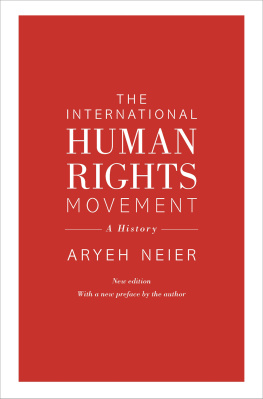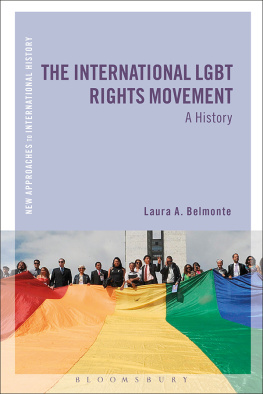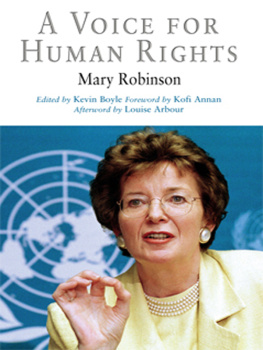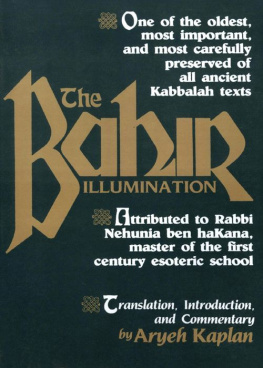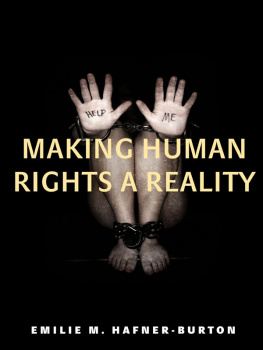THE
INTERNATIONAL
HUMAN
RIGHTS
MOVEMENT
H UMAN R IGHTS AND C RIMES AGAINST H UMANITY
Eric D. Weitz, Series Editor
The International Human Rights Movement: A History, New Edition
A RYEH N EIER
A World Divided: The Global Struggle for Human Rights in the Age of Nation-States
E RIC D. W EITZ
The Crime of Aggression: The Quest for Justice in an Age of Drones, Cyberattacks, Insurgents, and Autocrats
N OAH W EISBORD
The Killing Season: A History of the Indonesian Massacres, 196566
G EOFFREY B. R OBINSON
Evidence for Hope: Making Human Rights Work in the Twenty-First Century
K ATHRYN S IKKINK
They Can Live in the Desert but Nowhere Else: A History of the Armenian Genocide
R ONALD G RIGOR S UNY
Child Migration and Human Rights in a Global Age
J ACQUELINE B HABHA
The Young Turks Crime against Humanity: The Armenian Genocide and Ethnic Cleansing in the Ottoman Empire
T ANER A KAM
All the Missing Souls: A Personal History of the War Crimes Tribunals
D AVID S CHEFFER
Against Massacre: Humanitarian Interventions in the Ottoman Empire, 18151914
D AVIDE R ODOGNO
Stalins Genocides
N ORMAN M. N AIMARK
If You Leave Us Here, We Will Die: How Genocide Was Stopped in East Timor
G EOFFREY B. R OBINSON
Terror in Chechnya: Russia and the Tragedy of Civilians in War
E MMA G ILLIGAN
Torture and the Twilight of Empire: From Algiers to Baghdad
M ARNIA L AZREG
Cannibal Island: Death in a Siberian Gulag
N ICOLAS W ERTH, TRANSLATED BY S TEVEN R ENDALL, WITH A FOREWORD BY J AN T. G ROSS
Echoes of Violence: Letters from a War Reporter
C AROLIN E MCKE
THE
INTERNATIONAL
HUMAN
RIGHTS
MOVEMENT
A History
ARYEH NEIER
New Edition
With a new preface by the author
PRINCETON UNIVERSITY PRESS
Princeton & Oxford
Copyright 2020 by Princeton University Press
Requests for permission to reproduce material from this work
should be sent to
Published by Princeton university Press
41 William street, Princeton, New Jersey 08540
6 Oxford street, Woodstock, Oxfordshire OX20 1TR
press.princeton.edu
All Rights Reserved
Library of Congress Control number 2019953668
Paperback ISBN 978-0-691-20098-9
Ebook ISBN 978-0-691-20099-6
Version 1.0
First edition published 2012
Second printing, and first paperback printing, 2013
New edition, with a new preface by the author, 2020
British Library Cataloging-in-Publication Data is available
Preface
The seven years that have elapsed since the publication of the first edition of this book have been a difficult period for the international human rights movement. Xi Jinpings authoritarian regime in China and Vladimir Putins despotic regime in Russia have consolidated power, and both leaders have taken steps to ensure that they will hold on to power for the foreseeable future. Donald Trump became president of the United States in 2017, jettisoning American efforts to promote human rights internationally, reducing the protection of rights within the United States, and identifying himself and his administration as antagonists of a free, independent, and truth-seeking press as well as equal protection under the law for members of all races and religions. Neither the European Union nor any other individual government or association of governments has filled the gap left by the US abandonment of the effort to promote human rights globally, nor has any acted effectively to counter the Trump administrations negative impact on freedom of the press, and respect for racial and religious diversity and equality. A small number of Western governments, most notably Germany and Canada, speak out on human rights issues, and have had some success in protecting and giving shelter to individual victims of abuses. Yet they do not seem capable of exercising the geopolitical influence that is needed to modify substantially the practices of highly abusive states.
A number of significant regional powers are also now led by heads of state who are, to varying degrees, known for their disregard of rights. They include President Recep Tayyip Erdoan in Turkey, Supreme Leader Ali Khameinei in Iran, President Jair Bolsonaro in Brazil, President Abdel Fattah al-Sisi in Egypt, and Prime Minister Narendra Modi in India. Also, some smaller states that were previously democracies that generally respected rights are governed at this writing by despots who regularly abuse rights. They include the Philippines under President Rodrigo Duterte, Hungary under Prime Minister Viktor Orbn, Poland under Law and Justice Party leader Jaroslaw Kaczynski, and Venezuela under President Nicolas Maduro. Like Xi in China and Putin in Russia, several African leaders have ignored term limits or revised their countries constitutions in attempts to maintain lifelong rule. For a period, starting in the 1980s, the worldwide trend was movement in the direction of democracy and the protection of rights. Now, as the second decade of the twenty-first century draws to a close, the trend is for countries in different parts of the world to go in the direction of ethnic nationalism, state capture by corrupt elements, despotism, and, in some cases, increased authoritarianism.
Why has this trend taken place? In the 1980s and 1990s, democracy and the protection of human rights were expanding in different parts of the world. Communist dictatorships and anti-Communist military regimes alike were giving way to democratic government. Francis Fukuyama proclaimed the end of history and universalization of Western liberal democracy.
In 2002, a decade after the publication of Fukuyamas book, his pronouncement was echoed in the opening passage of the National Security Strategy of the United States issued by the George W. Bush administration. It stated:
The great struggles of the twentieth century between liberty and totalitarianism ended with a decisive victory for the forces of freedomand a single sustainable model for national success: freedom, democracy and free enterprise. In the twenty-first century, only nations that share a commitment to protecting basic human rights and guaranteeing political and economic freedom will be able to unleash the potential of their people and assume their future prosperity.
Apparently that prediction has been disregarded by Xi, Putin, and a host of other government leaders. By the end of the first decade of the present century, it rang hollow. In its second decade, liberal democracy lost additional ground. What produced the reversal?
It is a difficult question to answer. No single factor explains the shift. Without suggesting that they tell the whole story, it does seem possible, however, to identify a few of the reasons for the reversal.
One factor was widespread popular disappointment with liberal democratic governments because their advent was not accompanied by a general rise in economic prosperity. This disappointment has been particularly evident in the formerly Communist countries of Eastern Europe. During the Cold War, an implicit and sometimes explicit component of Western propaganda in the region was to link economic prosperity to political freedom. After the fall of Communism, a small number of persons acquired a great deal of wealth, but a great many persons did not make significant gains, and some were worse off. The great disparity between the economic fortunes of most persons in the region and those of the relatively small number who became wealthy apparently exacerbated the disappointment and resentment generated by the failure of political freedom to be accompanied more or less automatically by economic well-being. This seems to have produced substantial disenchantment with liberal democracy and contributed to the rise of populism in the region.


